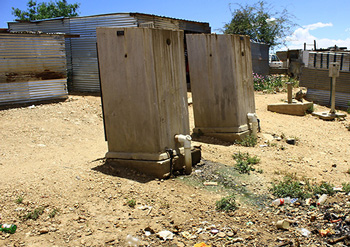
Development partners come together to support the elimination of hepatitis E

Development partners together with community members of Samora Marchel and Moses Garoeb Constituencies in the Khomas Region commemorated World Hepatitis Day, and simultaneously launched the Community-Led Total Sanitation (CLTS) campaign, to increase access to safe sanitation in the informal settlements.
Following the declaration of a health emergency in December 2017 due to a hepatitis outbreak, there has been an increased focus on the lack of inadequate water supply and poor sanitation, which are reported to be the main drivers of the outbreak in the informal settlements.
The launch of the campaign signals Namibia’s commitment in fighting viral hepatitis. The innovative
approach mobilises community members in the two constituencies to eliminate open defecation. It places a focus on mobilising behaviour change to ensure sustainable improvements which go beyond the provision of toilets.
The campaign triggers a need for collective change and a self-assessment process through which communities can better understand the risk of disease and the dangers of open defecation. Furthermore, it creates a greater sense of ownership for the community considering their own well being.
As part of his keynote address at the launch, the Executive Director of the Ministry of Health and Social Services, Mr. Ben Nangombe emphasised the need for the community to work together to ensure total elimination of the disease in the community. Additionally, he thanked the Japanese government for supporting Namibia in attempts to eliminate the disease and urged the communities to take care of the facilities and not vandalise them.
In his remarks at the launch, on behalf of the UN Namibia, the World Health Organisation Country Representative Dr. Charles Sagoe Moses said, “We are here to recognise that in order to curb the spread of Hepatitis E in the urban and informal settlements, good sanitation and hygiene for all can be achieved in Namibia”.
Access to improved sanitation is a basic human right, yet in Namibia, 46% nationally (Urban: 26% and Rural: 70%) practices open defecation. This is coupled with only 54% of the population practicing handwashing at critical times. Generally, when there is poor sanitation coverage, the health of populations is affected.
Dr. Charles Sagoe Moses noted that “The UN sister agencies are happy that the City of Windhoek and line ministries have embraced the Community-Led Total Sanitation
approach, not only to address the ongoing Hepatitis E outbreak but as a sustainable solution to address sanitation and hygiene challenges faced by Namibia.”
He congratulated community members, the Government of Japan for funding the Hepatitis E project through UNDP as well as the CampaignTask-force that has worked tirelessly to mobilize their communities to build their own toilets and improve their hygiene practices such as handwashing with water at critical times.
The elimination of Hepatitis is imperative to achieving the Sustainable Development Goals (SDGs) and Universal Health Coverage by 2030. The UN Namibia will continue to support national and regional policymakers to increase political and financial commitments for hepatitis response.










































